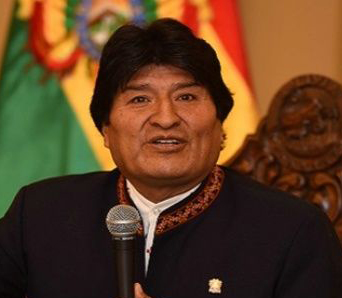 While Venezuela’s humanitarian crisis is drawing well-deserved international attention, there is another phenomenon that should ring alarm bells everywhere: the proliferation of what many in Washington see as “tolerable dictatorships.”
While Venezuela’s humanitarian crisis is drawing well-deserved international attention, there is another phenomenon that should ring alarm bells everywhere: the proliferation of what many in Washington see as “tolerable dictatorships.”
That’s the first thing that crossed my mind recently when Organization of American States Secretary (OAS) General Luis Almagro endorsed Bolivian President Evo Morales’ unconstitutional bid for a fourth term in office and when the Trump administration failed to condemn Morales’ re-election move.
Bolivia has become a “tolerable dictatorship,” a country whose president breaks the rule of law, but is not condemned by the world’s democracies.
That’s exactly what Venezuela and Nicaragua were until massive bloodshed on the streets forced the United States and other countries to pay attention. Before that happened, the two countries’ rulers were able to carry out slow-motion coups, gradually dismantling their countries’ institutions until they had absolute powers, while the rest of the world looked the other way.
Now, critics worry that Mexico and Brazil, which have recently elected populist leaders, could also see a gradual erosion of their democratic institutions, without being admonished by the international community.
Morales, who has been in power since 2005, officially launched his campaign for a fourth term on May 18, even though the Bolivian constitution does not allow for more than two consecutive presidential terms. In addition, Morales lost a Feb. 21, 2016, referendum that he himself had called in an effort to change the constitution and run for a new consecutive term.
What’s especially worrisome about Morales’ re-election campaign — and OAS chief Almagro’s blessing of it — is that it could set a dangerous legal precedent. As weird as it sounds, it could pave the way for presidents in other countries to use their own human rights as an excuse to stay in power indefinitely.
Morales is making the bizarre legal claim, previously tried in Costa Rica, Nicaragua and Honduras, that he can run for re-election because the 1969 American Human Rights Convention establishes that no one can be deprived of his right to run for public office.
He has argued that the Convention is an international treaty and therefore supersedes Bolivia’s national laws, including the constitution. To give some kind of legal cover to his argument, he had Bolivia’s Constitutional Tribunal — which he controls — validate his right to run for a new consecutive term in the Oct. 20 elections.
Morales officially launched his campaign on May 18, a day after Almagro visited Bolivia and — in a surprising political U-turn — said that it would be “absolutely discriminatory” to deprive Morales of his right to run for re-election.
Bolivia’s government and official media celebrated Almagro’s statement as a full-blown endorsement of Morales’ campaign. Opposition leaders lashed out against Almagro, speculating that he had changed his position in exchange for Bolivia’s vote for his upcoming re-election as OAS chief.
The Trump administration and Latin America’s biggest democracies have remained largely silent about Bolivia’s slow descent toward totalitarian rule.
At the time of writing, State Department Latin America chief Kimberly Breier had not yet condemned Morales’ move. During that time, she had written about 50 tweets, including many criticizing the Venezuelan and Nicaraguan regimes.
The Trump administration is making the same mistake that it made earlier in Nicaragua, and that the Obama administration made previously in Venezuela: failing to strongly criticize the gradual erosion of democratic institutions until there was widespread violence — and many deaths. By then, these countries’ dictators were firmly entrenched in power.
It’s time for the Inter-American Court of Human Rights, based in San Jose, Costa Rica, to issue a legal opinion making it crystal clear that its 1969 Convention should not be used by presidents to breach their constitutional term limits.
The Venice Convention, a branch of the European Council, has already taken that position. A follow-up legal opinion by the Inter-American Court would effectively force Almagro’s OAS to publicly denounce Morales’ re-election ruse, and any other similar effort in the future.
In the meantime, the Trump administration and Latin American countries should stop looking the other way at Bolivia’s dictatorship, or they will soon have to deal with many more Venezuelans.






